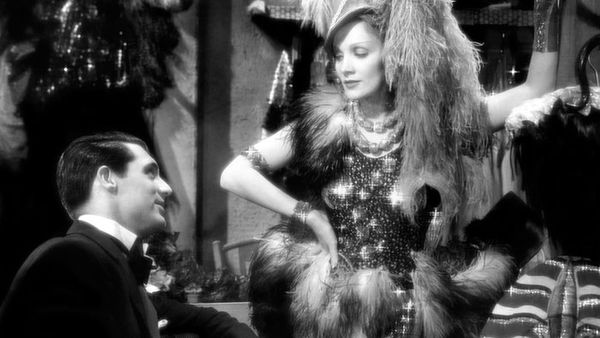Eye For Film >> Movies >> Blonde Venus (1932) Film Review

The shorthand for poverty in 1932 was to give the hairdresser a day off, but not the make up artist. Allowing director Josef von Sternberg the benefit of time, considering that Blonde Venus was made five years after the first talkie, his visual short cuts are easily forgiven.
The film opens with a bevy of giggling German chorus girls, skinny-dipping in a mountain stream, being gawped at by a laddish group of English ramblers. The next thing you know is the prettiest of the girls in married to the most pompous of the men, living in New York with their five-year-old son Johnny (excellent Dickie Moore).

Her name is Helen (Marlene Dietrich) and his is Ned (Herbert Marshall). He is a scientist/inventor, who struggles to make ends meet and suffers from a mysterious illness that can only be cured by going to Europe and having expensive treatment at a specialist clinic.
As a plot ploy, this gets her out of the apartment to make the money to save his life. She goes back to what she knows best, the stage, or, to be precise, the night club as a singer, soon to have her nom-de-nuit, The Blonde Venus, in lights, where she meets millionaires and men of influence, including playboy Nick Townsend (ridiculously young Cary Grant), who falls stocks-over-shares for her. With the help of Nick's "generosity," Ned can afford to go abroad, while Helen pays her dues in the traditional way.
The sophistication of the storyline is impressive for the period, because what you expect is not what you get. The cabaret sequences are glamorous enough, with Dietrich in seductive form, but this is not There's No Business Like Show Business. It is a moralistic tale of infidelity and childcare, love and guilt, riches and destitution, song and dance.
Dietrich's ethereal beauty remains intact, despite living rough in the Deep South, while Marshall is stoical to the end, incapable of expressing his feelings, falling back on a well rehearsed sulk to indicate self pity in the repressed upper-middle-class English manner.
Grant is already honing his style and makes for light relief after the intensity of Helen and Ned's marital gridlock. In movies, success is instantaneous for the right person. Helen makes it immediately in the clubs, loses everything when Ned finds out about Nick, is on the run with Johnny for a time, before losing her son to her estranged husband and being penniless, alone and living with chickens until she turns up in Paris and is a star again. How, oh how?
It is the mystery of stardom and, in this case, the magic of Marlene.
Reviewed on: 04 Dec 2006


















